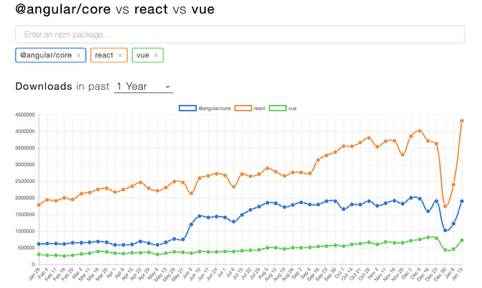When it comes to choosing the right framework for your project, it can get tricky. This decision alone can impact the finish result of the project. It can be either a success or a failure and it’s up to you how it ends. Both Angular and VueJS are great frameworks that can be used to create big projects. They also have their disadvantages that can result in various different problems along the way. So which framework to choose?
Angular
Angular is an open source framework that allows developers creating front-ends on the highest level of advancement. This framework is supported by Google and is continuously updated not only by them but also community that grew to a very large scale over the years. This has definitely helped Angular to reach the level of popularity it has now. It has a lot of pre-made modules ready to use without the need of having to write them yourself. On GitHub.com you can see that Angular received over 11.000 pull requests. It shows that its community is really active and rapidly growing. Using less popular framework creates a risk of having to deal with problems on your own. Using Angular gives you a sense of security in that matter. It is used by huge enterprises like PayPal, Sony and Weather, which obviously gives a lot of credibility to this framework. Angular’s gathered over 44.000 stars on GitHub.com and the first version AngularJS has over 59.000 stars, which gives total of over 103.000 stars since the beginning of its existence.
Vue
Vue.js on the other hand is a JavaScript based framework designed by Evan You, a former Google developer. Vue officially launched in February of 2014. Since then it’s gathered a big amount of supporters, mainly because of its simplicity. Over the course of its existence, Vue has collected more than 125.000 stars on GitHub.com. It outruns Angular and AngularJS both combined. At the same time Vue.js has received only a little bit over 1.300 pull request, which places it far behind in comparison to Angular.

5 Pros Of Choosing Angular
Let’s start with 5 top advantages, that BoostHigh believes, are the best features of Angular.
- Command-Line Interface is an Angular tool that you can use for creating apps in a command shell. This console can compile your code and allows you to add new dependencies. It generates files that are based on Angular scheme, creates configurations for Unit Testing and End-to-End testing. It also extracts translation from source code to output file.
- Server Side Rendering – Thanks to Server Side Rendering (SSR), pages work faster on clients side. That can be the answer to the heaviness problem. This makes the framework more SEO friendly.
- TypeScript – Angular uses TypeScript language, which is more advanced and mature, in comparison to JavaScript. It navigates and auto completes your code for you. Using TypeScript challenges developers to upgrade their standards and teaches them a better way of coding.
- Community size – The number of users and supporters of each framework is extremely important while deciding on which one you’re gonna work. The bigger the community is, chances of getting stuck with an error you wouldn’t know how to solve are smaller. Developers constantly send pull request that are being verified by Google and because of that, Angular itself is less problematic and more advanced.
- Architecture – Angular’s architecture allows you to to divide application into smaller parts like modules, components. You can also declare directives that can change the appearance or behavior of a DOM element or pipes that transform data. You can also use these elements to create different apps, without the need to write them again. It also makes maintaining and updating the code simpler.
5 Cons Of Choosing Angular
Even though, these pros were pretty impressive, there’s no such a thing as perfect framework. Below you can find out 5 cons of this framework.
- Performance – Angular is one of the heaviest amongst all of JavaScript frameworks. What comes with that, it can affect the speed of your finish product. If the project doesn’t require a lot of advanced tools, maybe you should consider using lighter framework (such as Vue.js for instance).
- TypeScript – While it is a huge advantage to a lot of developers, for some of them it can be a big NO. If you’ve never used Angular before, more specifically TypeScript, you’re gonna have to spend some time learning it before starting a project. It’s gonna make a whole process longer and harder for you.
- Steep learning curve – Angular is an advanced framework and there is always more than one way to achieve the same result. This has caused some confusion among engineers. However, the abundance of tutorials and issue discussions allowed resolving most of the problems. It requires a strong engineering background to use in complex scenarios.
- Versions differences – There’s a huge difference between the first AngularJS framework and its followers. Older version can cause problems in supporting and many developers reject offers that require dealing with that version.
- Angular creates non-valid HTML – Code created by Angular doesn’t pass W3C validation.
5 Pros Of Choosing Vue.js
Now it’s time to look into Vue.js. Is this as good as Angular? Or maybe even better? Let’s find out.
- Size – It’s one of the first and the biggest advantages of Vue.js framework. Evan You made sure that it’s as light as it can be with only 18kb after gzipping.
- Performance – Because of its small size it’s extremely fast, what makes it perfect for single page sites. That’s a huge advantage in comparison to Angular that has some troubles with the speed.
- Simplicity – Vue.js is one of the most intuitive of all JavaScript frameworks. Because of that, it is often the framework of choice for junior developers that are looking for a place to start their career in software developing. Vue.js also has CLI but it is more basic than the one that Angular provides.
- Readability – It is easier for developers to read and understand written code. What comes with that, it’s easy for experienced developers to learn this framework. It’s also a perfect framework for new people to start learning how to code.
- Server Side Rendering – Vue.js has SSR, as does Angular. It helps the page work faster on clients side.
5 Cons Of Choosing Vue.js
Let’s not forget that there are cons to every framework, so below you and find what we think are the biggest disadvantages of Vue.js.
- Community size – Although, the amount of users is growing rapidly, there’s still lack of support from them when it comes to updating the framework. Most updates come from Evan You and obviously in comparison to Google’s support with Angular, it’s still far behind.
- Lack of important plugins/components – Unfortunately Vue.js lacks in some of really important options (such as Google Maps), what makes it harder for a developer and can impact on the length of the project.
- Over-flexibility – Vue.js is very flexible, which can be a big advantage in some cases. Unfortunately, when it comes to more complex projects that require more developers to be involved, things can get unnecessary complicated due to over-flexibility.
- External Library – Vue.js recommends using axios to consume APIs, while Angular has its own library. This one is definitely a big disadvantage comparing to Angular.
- Language barrier – Vue.js is mostly used in Asia, which also means that most of members of the community is from there and unfortunately don’t speak English. This makes communication a lot harder for people from other regions.
Example
So you can understand it better, below you can find an example how we decided which framework we’re going to choose. BoostHigh has been working on a Ticket Machine for Public Transport Company. This project required both embedded software and a web system. Our developers decided to use Angular as their framework of choice for creating a front-end for this project. System required a lot of advanced modules that were easier and faster to make using Angular, since it already has most of needed modules implemented. Using Angular allowed them to achieve the highest level of advancement while maintaining good standards of coding thanks to TypeScript usage.
Summary
Both, Angular and Vue.js are extremely good frameworks that can help you finalize some big projects but you have to remember that it is crucial to choose the right one. Usually, Angular works better with bigger projects, that requires a lot of tools. On the other hand, Vue.js is perfect for single page sites. It’s up to you to decide which one will perform better as the finish product. If you’re still not sure, which one is better for you, don’t hesitate to ask us for an opinion. Our experts will advise you and help you in getting your project to fruition.









